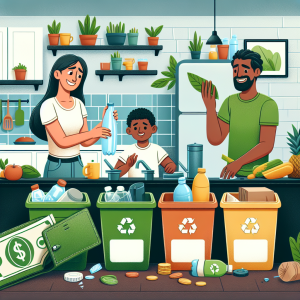Recycling and Its Role in Tackling Climate Change
Recycling plays a critical role in mitigating the effects of climate change by reducing the amount of waste sent to landfills, conserving natural resources, and cutting greenhouse gas emissions. Understanding the intricate mechanisms through which recycling contributes to a healthier planet is essential for promoting sustainable practices among individuals and communities.
At the heart of recycling’s impact on climate change is the reduction of waste. When waste is not recycled, it typically ends up in landfills where it decomposes anaerobically, releasing methane—a potent greenhouse gas approximately 28-36 times more effective than carbon dioxide at trapping heat over a 100-year period. By diverting organic waste such as paper, cardboard, and certain types of plastics to recycling facilities, we not only reduce landfill mass but directly decrease methane emissions.
Conservation of natural resources is another powerful way recycling aids in combating climate change. Manufacturing products from raw materials often involves extraction processes that are energy-intensive and environmentally destructive. For instance, mining for metals or drilling for oil can lead to deforestation, habitat destruction, and significant carbon emissions. On the contrary, recycling materials uses considerably less energy; for instance, producing aluminum from recycled materials requires up to 95% less energy than producing it from bauxite ore. This substantial reduction in energy consumption translates directly into lower carbon emissions.
Notably, the paper recycling process saves about 17 trees per ton of paper recycled. Trees are indispensable in the fight against climate change due to their ability to absorb carbon dioxide during photosynthesis, thus helping regulate atmospheric CO2 levels. By recycling paper, we preserve more trees and help maintain their role as carbon sinks.
The relevance of recycling in energy conservation extends to various materials. For example, recycling one ton of plastic saves approximately 5,774 kWh of electricity, 22 cubic meters of landfill space, and reduces water pollution by up to 70%. These statistics highlight the significance of enhancing recycling rates for plastics. This advancement can be further bolstered by innovative recycling technologies like chemical recycling, which breaks down plastics into their original monomers, thus providing higher-quality recycled material that can serve as a substitute for virgin plastics in manufacturing.
Recycling also plays a transformative role in reducing industrial greenhouse gas emissions. The steel industry serves as a quintessential example, where significant reductions in CO2 emissions can be achieved by melting scrap steel in electric arc furnaces instead of using blast furnaces fed by iron ore. This shift not only reduces reliance on coal-dependent processes but also enhances the circular economy by cycling scrap metal back into the production of new steel products.
Public participation in recycling programs is key to amplifying these benefits. However, countries face numerous challenges that hinder effective recycling, including inadequate infrastructure, low public awareness, and contamination of recyclable material streams. Improving waste management systems across municipalities can significantly enhance recycling rates and thus further contribute to climate change mitigation efforts. By investing in education campaigns, policymakers can increase public understanding and engagement with recycling initiatives, ensuring that recyclable materials are adequately sorted and free from contaminants.
Collaborative efforts across industries can also bolster recycling initiatives. Corporations are increasingly committing to zero-waste-to-landfill policies and designing products that are easier to recycle. By prioritizing eco-design principles, companies can create products with fewer mixed materials, ensuring straightforward recyclability. Moreover, Extended Producer Responsibility (EPR) schemes mandate producers to manage the lifecycle of their products’ waste, incentivizing the development of more sustainable products and reducing the burden on waste management systems.
Innovation remains at the forefront of enhancing recycling’s impact on rectifying climate change. Advanced technologies such as AI-driven sorting robots, which accurately distinguish between different materials, are paving the way for more efficient recycling processes. Similarly, blockchain technologies can improve the transparency and traceability of recycled materials, promoting accountability and facilitating compliance with recycling standards.
The intersection of policy, technology, and community initiatives presents a holistic approach to maximizing recycling’s climate impact. Policies such as carbon pricing and emission trading systems can indirectly benefit recycling sectors by making resource-intensive production less economically attractive. Government incentives for green technologies can further catalyze the adoption of innovative recycling solutions, fostering an environment conducive to climate-friendly practices.
Ultimately, recycling, when integrated with comprehensive climate strategies, has the potential to substantially curtail carbon footprints at the individual, municipal, and global levels. Whether it’s through reducing emissions, conserving energy, or preserving our natural ecosystems, recycling emerges as an accessible and practical strategy to assist in the battle against climate change. Leveraging its full potential requires a concerted effort from individuals, businesses, policymakers, and communities alike, all working together towards a sustainable, low-carbon future.




